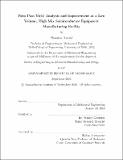| dc.contributor.advisor | Stanley Gershwin. | en_US |
| dc.contributor.author | Anand, Shaswat | en_US |
| dc.contributor.other | Massachusetts Institute of Technology. Department of Mechanical Engineering. | en_US |
| dc.date.accessioned | 2017-01-30T18:50:36Z | |
| dc.date.available | 2017-01-30T18:50:36Z | |
| dc.date.copyright | 2016 | en_US |
| dc.date.issued | 2016 | en_US |
| dc.identifier.uri | http://hdl.handle.net/1721.1/106686 | |
| dc.description | Thesis: M. Eng. in Advanced Manufacturing and Design, Massachusetts Institute of Technology, Department of Mechanical Engineering, 2016. | en_US |
| dc.description | This electronic version was submitted by the student author. The certified thesis is available in the Institute Archives and Special Collections. | en_US |
| dc.description | Cataloged from student-submitted PDF version of thesis. | en_US |
| dc.description | Includes bibliographical references (page 79). | en_US |
| dc.description.abstract | "Improve quality, you automatically improve productivity " - W. Edwards Deming Quality is the heart and soul of any manufacturing unit. Quality metric stagnation at a high mix semiconductor equipment manufacturing facility was the motivation for this project. An analysis was done to understand the working and importance of the quality metrics, First Pass Yield and Quality Notifications per Module, to understand the reasons for its stagnation over the past couple of years at the assembly plant. Also module specific study was done to understand the trends in the quality improvement and the improvements achieved on different modules assembled at the facility. As per scientific method, a hypotheses tree was laid out with a view to ascertain the reasons behind the plateauing of the quality metrics. Further these metrics were tested using data from the ERP software (SAP), other tailor made software packages and from discussions and interviews with assembly floor people and the manufacturing and quality engineers. As a result of this work shortages of critical parts was found out to be a crucial contributor to the quality issues arising on the shop floor because of the extra exposure time of the assemblies and building the assemblies out of procedure in such a case. Various alternative strategies are suggested to improve service levels along with the economical impact these strategies shall have. Finally, invaluable data collections suggestions are a part of this work which shall act as enablers in the continuous journey of quality improvement. | en_US |
| dc.description.statementofresponsibility | by Shaswat Anand. | en_US |
| dc.format.extent | 79 pages | en_US |
| dc.language.iso | eng | en_US |
| dc.publisher | Massachusetts Institute of Technology | en_US |
| dc.rights | MIT theses are protected by copyright. They may be viewed, downloaded, or printed from this source but further reproduction or distribution in any format is prohibited without written permission. | en_US |
| dc.rights.uri | http://dspace.mit.edu/handle/1721.1/7582 | en_US |
| dc.subject | Mechanical Engineering. | en_US |
| dc.title | First pass yield analysis and improvement at a low volume, high mix semiconductor equipment manufacturing facility | en_US |
| dc.type | Thesis | en_US |
| dc.description.degree | M. Eng. in Advanced Manufacturing and Design | en_US |
| dc.contributor.department | Massachusetts Institute of Technology. Department of Mechanical Engineering | |
| dc.identifier.oclc | 969773453 | en_US |
